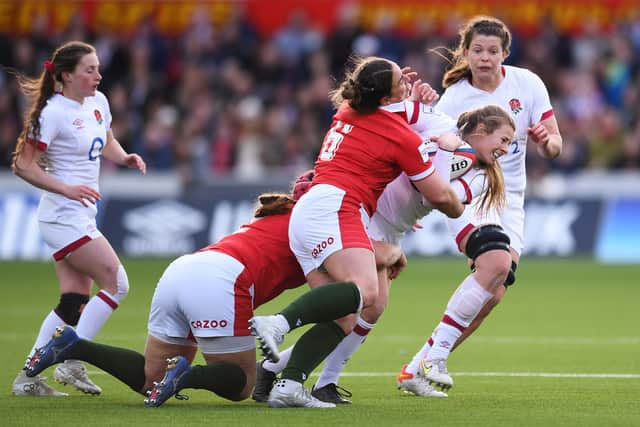Six Nations proves women's rugby potential but 'contract' issue needs to be addressed for sake of progression
and live on Freeview channel 276
The Women’s Six Nations drew to a close this on Saturday 30 April and while it was a tournament for the record books, with history being made, there are still many trials and tribulations to overcome when it comes to thinking of the future of Women’s Rugby.
The TikTok Six Nations concluded with Super Saturday hosting matches between Wales and Italy, Ireland and Scotland and a Gram Slam decider between France and England.
Advertisement
Hide AdAdvertisement
Hide AdEngland headed into their final match having won their previous four by a margin of at least 50 points.
France was always going to offer a different level of competition than the other nations in the Six Nations, and so they did, challenging England by scoring a try within the first five minutes.
However, England came through and won their fourth consecutive Six Nations title, beating their French opponents 24-12.
Sitting at the top of the table, England have a point difference of 260, with only 22 points scored against them. At the other end of the table, we see Scotland with no wins and a points difference of -85.
Advertisement
Hide AdAdvertisement
Hide AdIn the lead up to the competition, there were two historic news stories that hit the headlines. For the first time, the women’s tournament had their own title partner. TikTok came in as the tournament’s sponsor and the investment from the social media giants were set to be felt by every Union.
The second excitement was that Wales announced 12 players had been given full-time professional contracts.


England and France were initially the only two teams to have full-time professional players, but this year progress was being made and they were joined by another nation for what was set to be a ground-breaking tournament in the women’s game.
Unsurprisingly, the results of the tournament matched each team’s contract situation.
Advertisement
Hide AdAdvertisement
Hide AdEngland, with an entirely professional team, came out on top; France - also with an entirely professional team that was instigated after England announced they would go pro - came in second; Wales came in third; Italy - whose women have part-time professional contracts - came in fourth while Ireland and Scotland, who sit well behind their Six Nations counterparts in terms of contracts, came in fifth and sixth respectively.
While this in no way diminishes the tremendous efforts of Sarah Hunter and her Red Roses, it’s not surprising that the team with the most professional setup went on to win the tournament.
Equally, it is also naive to imagine that the women’s game can match their male counterparts at this stage.
The Rugby Football Union was officially formed in 1871 and in the same year England and Scotland played the first ever international match.
Advertisement
Hide AdAdvertisement
Hide AdThe Women’s game does not boast such history. The first ever recorded women’s rugby union took form in 1962 and it was not until 1978 that the first non-university rugby clubs were formed (Canada and the Netherlands). Just under 20 years after this point, England’s men would then receive their first ever professional contracts, meanwhile England’s women would have to wait until 2016.
Additionally, while the average salary for the top French rugby players is somewhere in the region of €240K per year, their female counterparts are receiving under €20K a year.
The same level of professionalism is expected on and off the pitch, the same commitment to training is expected and in 2018, four out of five players on the list for the World Rugby’s women’s player of the year were French, while no French men were listed on the nominees for the equivalent award in the men’s game in the same year.


While there is a disparity between the French and English contracts, these pale into significance when we consider the Scottish situation. The average salary for an Edinburgh Rugby Player (not even a Scottish international) sits in the region of £120k-140K a year meanwhile there has been no news regarding the professionalism of the women’s game since 2019.
Advertisement
Hide AdAdvertisement
Hide AdJade Konkel was named as Scotland’s first female pro in 2016, after which 10 more players were listed as contracted.
In an interview with the Scotsman, Scotland’s manager Bryan Easson said that all 35 of the squad have ‘an individual package now that suits their lives’ and they no longer use the term ‘contract’.
The worry is that this sounds like a major step backwards and a fancy way of saying there is no intention for full-time professional contracts to be instigated.
Scotland’s women receive far less funding than England’s women, but this should not mean that the Scottish Rugby Union look for ways to cop-out.
Advertisement
Hide AdAdvertisement
Hide AdIt should signify that something needs to shift and one day (hopefully in the not too distant future thanks to the rise in support for Women’s Rugby in recent months), we may have a Six Nations where all players are on the same footing.
Maybe then, after the disparity within the women’s game has begun to diminish, we can talk about how far we have to go before it catches up with the men’s.
Comment Guidelines
National World encourages reader discussion on our stories. User feedback, insights and back-and-forth exchanges add a rich layer of context to reporting. Please review our Community Guidelines before commenting.
